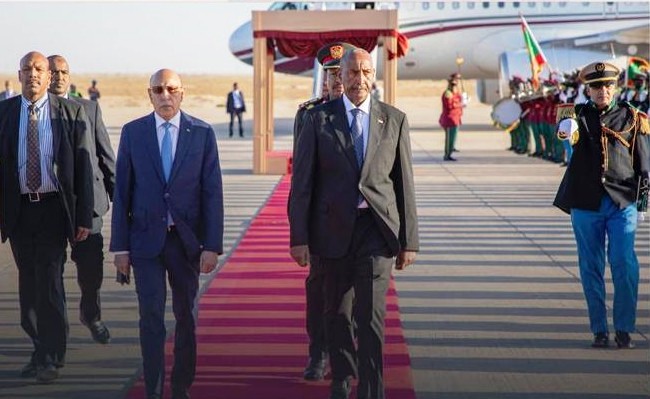Sudan’s Burhan courts West Africa in diplomatic push amid war and humanitarian crisis
January 16, (PORT SUDAN) – As a pivotal African Union summit looms, Sudan’s military leader, General Abdel Fattah al-Burhan, has wrapped up a five-nation tour of West Africa, seeking to rally support and potentially pave the way for lifting the country’s suspension from the continental body. The diplomatic push comes against a backdrop of a devastating war, warnings of an impending famine, and shifting battle lines that have seen the Sudanese army regain ground from the paramilitary Rapid Support Forces (RSF).
Al-Burhan’s visits to Mali, Guinea-Bissau, Sierra Leone, Senegal, and Mauritania – his first foray into West Africa since the conflict erupted last April – mark a significant broadening of Sudan’s diplomatic efforts. Previously, his outreach had primarily focused on neighbouring countries. The trip comes nearly three years after Sudan’s membership in the African Union was suspended following a military coup in October 2021. While the AU, through its Commissioner for Political Affairs, Peace, and Security, Bankole Adeoye, has reiterated its firm stance against military takeovers, there are whispers of a possible thaw in relations with Khartoum.
Sources close to the Sudanese government suggest that recent military gains by the army may have created a more favourable environment for dialogue. A senior Sudanese foreign ministry official, speaking on condition of anonymity, told Sudan Tribune that the tour was a “crucial opportunity” to present Khartoum’s narrative of the conflict and highlight the alleged role of foreign actors.
Throughout his West African tour, Al-Burhan consistently pointed to external interference in Sudan’s war, aiming thinly veiled accusations at unspecified countries for allegedly fueling the conflict through the provision of mercenaries to the RSF. While he refrained from naming names, analysts suggest these remarks were primarily directed at the United Arab Emirates and Chad, both accused by some of supporting the paramilitary group – allegations both countries deny.
“The General’s message was clear,” said Rashid al-Sheikh, an expert on international relations. “He sought to portray Sudan as a victim of external aggression and rally African solidarity against foreign meddling.”
Beyond the rhetoric, Al-Burhan’s diplomatic offensive had three concrete objectives, according to the foreign ministry official: exposing the alleged influx of foreign mercenaries fighting alongside the RSF, lobbying for the lifting of Sudan’s AU suspension, and engaging with countries holding seats on the UN Security Council and the AU Peace and Security Council.
A tThree-pronged conflict and shifting alliances
The conflict in Sudan, Dr. al-Sheikh argues, is playing out on three interconnected levels: a strategic contest for regional influence, a domestic political power struggle, and the brutal reality of the war on the ground. He posits that a de-escalation on the strategic front could potentially create space for political dialogue and ultimately impact the battlefield dynamics.
In this context, Sudan’s recent pivot towards countries like Russia, China, Iran, and Turkey – nations known for their pragmatic approach to international relations – has become a defining feature of its foreign policy. According to Dr. al-Sheikh, this eastward shift has resulted in a deeper engagement with these powers in Africa, potentially overshadowing the influence of Western nations.
“These new partnerships are built on a transactional logic,” Dr. al-Sheikh explained. “They offer Sudan a degree of flexibility and leverage that it previously lacked.” Some see the visit of Ethiopian Prime Minister Abiy Ahmed to Sudan as a further indication of these realignments.
Mercenaries, terrorism, and the spectre of instability
Beyond the high-level diplomacy, Al-Burhan’s tour also touched upon pressing security concerns shared by many West African nations. Dr. Mohieldin Mohamed Mohieldin, a Sudanese political analyst, highlights the issue of mercenaries from the region reportedly fighting with the RSF. He argues that the Sudanese army’s recent advances could trigger a wave of these fighters returning to their home countries, potentially destabilizing the already fragile Sahel region.
“There’s a real risk of spillover,” Dr. Mohieldin warned. “These fighters, battle-hardened and often linked to extremist groups, could pose a significant threat to the security of their countries of origin.”
Furthermore, the tour addressed the shared challenge of combating terrorism, with Al-Burhan reportedly seeking closer cooperation with West African states in countering the threat posed by groups like ISIS, Boko Haram, and Al-Qaeda affiliates operating in the Sahel.
Economic undercurrents and the Silk Road connection
While security and political considerations dominated the agenda, economic factors also played a subtle role. Dr. Mohieldin points to China’s ambitious Belt and Road Initiative, particularly the planned “Silk Road” route connecting the Red Sea to the Atlantic Ocean through Sudan, as a potential driver of future cooperation.
“Enhanced connectivity could unlock significant economic opportunities for Sudan and its West African partners,” Dr. Mohieldin noted.
A long road to reintegration
As Al-Burhan returns to a country still ravaged by war and facing a humanitarian crisis, the success of his West African charm offensive remains to be seen. While the tour may have opened some doors and fostered a degree of understanding, Sudan’s path back to full reintegration into the African fold is likely to be long and arduous.
Dr. Ibrahim Idris, a Sudanese expert in strategic studies, emphasizes the symbolic importance of the trip in reaffirming Sudan’s commitment to its African identity and its role as a founding member of the Organization of African Unity (the AU’s predecessor).
“Despite the internal turmoil,” Dr. Idris stated, “Sudan is demonstrating its determination to remain an active and engaged member of the African community.” Whether that determination will translate into concrete action and a lifting of the AU suspension remains the key question as the continental summit draws near. The answer will not only shape Sudan’s future but also send a powerful signal about the African Union’s commitment to upholding democratic principles and its ability to navigate complex crises on the continent.

